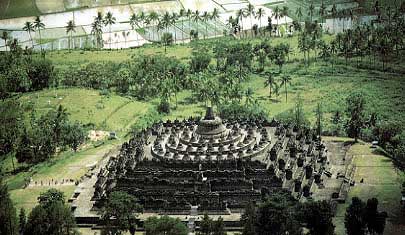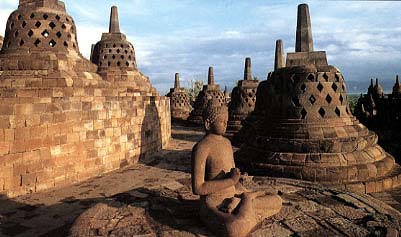Nearly 3,000 dead in Java quake
More than 2,700 people have been killed and thousands more injured by a strong earthquake that struck the Indonesian island of Java, officials have said.
The quake, measuring 6.2, flattened buildings in a densely-populated area south of the city of Yogyakarta, near the southern coast of Java.
Witnesses said people fled as their homes collapsed around them, after the quake struck early in the morning.
Electricity and communications across the city were also down, police said.
At least 2,900 people have been injured, and many more are still thought to be trapped under rubble and collapsed buildings.
Indonesian President Susilo Bambang Yudhoyono has ordered the military to help evacuate victims, and plans to visit the area later on Saturday.
Yogyakarta's airport was closed. Local media said the runway had cracked and part of a roof had caved in.
Yogyakarta is near the Mount Merapi volcano, which threatened to erupt earlier this month, forcing thousands of people to be evacuated.
The earthquake is not thought to be caused by the volcano, but there are reports of heightened activity in its vicinity.
Officials said that although the area affected was coastal there was no tsunami resulting from the quake.
'Concrete chunks'
The quake hit at 0554 local time (2253 GMT Friday), around 25km (15 miles) south of the city of Yogyakarta, the US Geological Survey (USGS) said.
Yogyakarta, Indonesia's ancient royal capital and one of its biggest cities, is about 440km (275 miles) south-east of the capital, Jakarta.
The earthquake was felt to be massive - larger than the locals here say they've felt in their lives," said Brook Weisman-Ross, regional disaster co-ordinator for Plan International children's charity in Java.
"I was shaken from my bed... As furniture was falling, concrete chunks started falling from my hotel room as people were running out in panic in their bedclothes," he told the BBC.
He said there was extensive damage across the city and that many of the smaller, older houses had collapsed.
But a wide swathe south of the city, in the Bantul and Kulonprogo regions, appears to be the worst hit.
The BBC's Orlando Guzman in Yogyakarta says every other house on the main road south of the city is either flattened or seriously damaged.
bbc
may Allah subhana wa Ta'ala grant them all patience.



